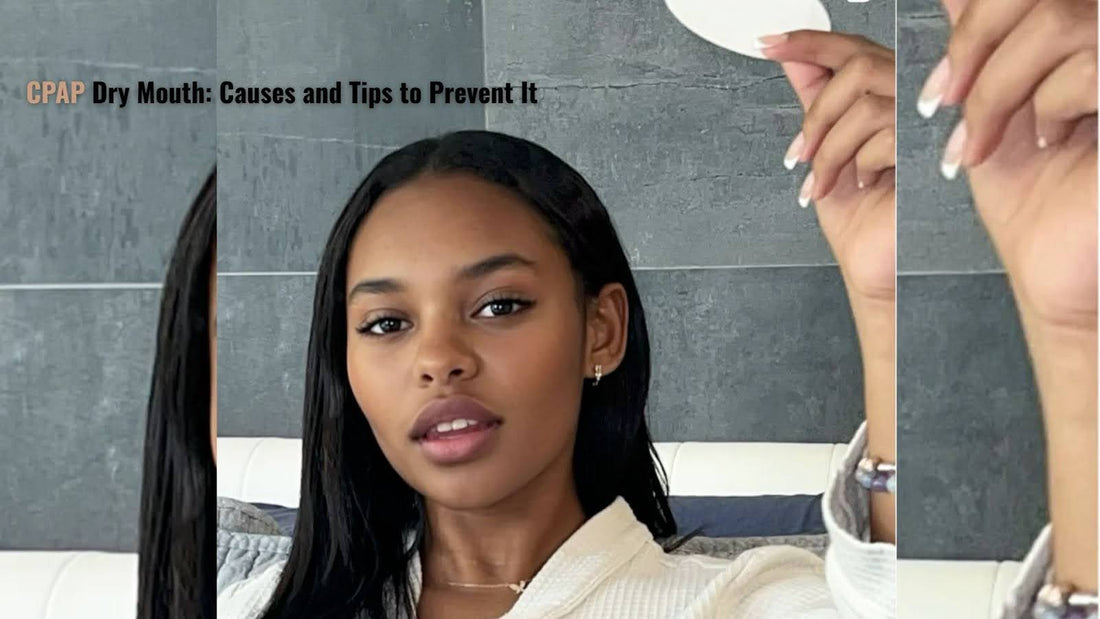La ventilation en pression positive continue (PPC) est un traitement fiable contre l'apnée obstructive du sommeil, permettant de retrouver un sommeil réparateur et de préserver la santé à long terme. Pourtant, pour de nombreux utilisateurs au Canada et aux États-Unis, la sécheresse buccale causée par la PPC est un effet secondaire frustrant qui peut perturber le sommeil, la santé bucco-dentaire et même l'observance du traitement. Cet article détaille les fondements scientifiques de la sécheresse buccale causée par la PPC, explore des solutions éprouvées, notamment les bienfaits scientifiques du ruban adhésif buccal, et propose des conseils pratiques et concrets de prévention, le tout appuyé par des recherches de pointe.
Qu'est-ce que la bouche sèche CPAP ?
La sécheresse buccale liée à la PPC désigne la sécheresse buccale inconfortable et le manque d'humidité ressentis par de nombreux utilisateurs pendant ou après un traitement par PPC. Cette sensation peut aller d'un léger inconfort à une sécheresse buccale sévère, entraînant parfois des difficultés à avaler, une mauvaise haleine, voire des problèmes bucco-dentaires. Des études estiment que jusqu'à 40 % des utilisateurs de PPC déclarent régulièrement souffrir de sécheresse buccale, une cause majeure de non-observance du traitement, comme l'explique le Journal of Clinical Sleep Medicine .
Causes de la sécheresse buccale due à la CPAP
Comprendre les causes profondes de la sécheresse buccale due à la PPC est essentiel pour une prévention efficace. Les principales causes sont :
Respiration buccale pendant le sommeil
La respiration buccale est la principale cause de sécheresse buccale due à la PPC. Lorsque la bouche reste ouverte pendant le sommeil, que ce soit par habitude, par congestion nasale ou par un masque mal ajusté, l'air sous pression de l'appareil PPC passe par la bouche, desséchant rapidement la muqueuse buccale. Ce phénomène est particulièrement fréquent chez les utilisateurs de masques nasaux ou de masques narinaires, où l'air peut s'échapper par la bouche si celle-ci n'est pas maintenue fermée. Une étude publiée dans le Journal of Clinical Sleep Medicine et une revue de 2017 publiée dans PMC confirment que les fuites d'air et la respiration buccale sont les principales causes de sécheresse buccale liée à la PPC.
Fuites de masque
Un masque CPAP mal ajusté peut provoquer des fuites d'air, permettant à l'air comprimé de s'échapper et d'assécher la bouche. Les fuites aggravent la sécheresse buccale et réduisent l'efficacité du traitement. Les experts en médecine du sommeil recommandent un ajustement régulier du masque pour minimiser les fuites et l'inconfort.
Diminution de la production de salive
La thérapie CPAP peut modifier la dynamique de pression dans la bouche, réduisant parfois le flux salivaire et entraînant une sécheresse. La salive est essentielle à la santé bucco-dentaire, car elle contribue à neutraliser les acides, à éliminer les bactéries et à maintenir l'hydratation des tissus. L'absence de salive peut également augmenter le risque d'infections buccales et de problèmes dentaires, comme le décrit l'étude de Bortolotti de 2017 .
Autres facteurs contributifs
- Médicaments : De nombreux médicaments courants (antihistaminiques, décongestionnants, antidépresseurs) mentionnent la sécheresse buccale comme effet secondaire.
- Déshydratation : Ne pas boire suffisamment d’eau tout au long de la journée peut aggraver les symptômes.
- Âge : Les personnes âgées produisent naturellement moins de salive.
- Problèmes de santé sous-jacents : le diabète, le syndrome de Sjögren et d’autres affections peuvent réduire la production de salive.
- Symptômes courants
Reconnaître les symptômes de la sécheresse buccale sous PPC peut aider les utilisateurs à agir rapidement. Parmi ceux-ci, on peut citer :
- Se réveiller avec la bouche collante, sèche ou desséchée
- Difficulté à avaler ou à parler au réveil
- Mauvaise haleine (halitose)
- Mal de gorge ou enrouement
- Augmentation de la soif la nuit
- Lèvres gercées ou aphtes
- Risque accru de caries dentaires ou de maladies des gencives
Conseils pour prévenir la sécheresse buccale due à la CPAP
Des stratégies scientifiques peuvent contribuer à minimiser, voire à éliminer, la sécheresse buccale due à la PPC. Voici ce qui fonctionne :
1. Utilisez un humidificateur chauffant
L'ajout d'un humidificateur chauffant à votre système CPAP est l'un des moyens les plus efficaces de lutter contre la sécheresse buccale. Les humidificateurs humidifient l'air, prévenant ainsi l'effet desséchant du flux d'air sous pression. La plupart des appareils CPAP modernes sont équipés d'humidificateurs intégrés avec réglages réglables. Une étude de 2023 réalisée par SleepApnea.org et la Sleep Foundation souligne que l'humidification est un traitement de première intention.
2. Assurez-vous que le masque est bien ajusté
Un masque bien ajusté minimise les fuites d'air et dirige correctement le flux d'air. Si vous constatez des fuites ou une gêne, consultez votre spécialiste du sommeil ou votre fournisseur d'équipement pour un réajustement. Évitez de trop serrer, car cela peut provoquer des escarres et aggraver les fuites.
3. Favoriser la respiration nasale
Encourager la respiration nasale est essentiel pour prévenir la sécheresse buccale. La respiration nasale humidifie et filtre naturellement l'air, réduisant ainsi la sécheresse buccale et améliorant la qualité du sommeil. En cas de congestion nasale, envisagez les sprays salins ou les bandelettes nasales pour dégager les voies respiratoires.
4. Essayez le ruban adhésif buccal ou les mentonnières
Le ruban adhésif buccal est un outil scientifiquement prouvé qui maintient les lèvres fermées en douceur, favorisant la respiration nasale et prévenant les fuites buccales. Un essai clinique de 2022 publié dans le Journal of Clinical Medicine a révélé que l'utilisation de ruban adhésif buccal pendant le sommeil améliorait le ronflement et la gravité de l'apnée du sommeil chez les personnes respirant par la bouche et souffrant d'AOS légère, réduisant ainsi l'indice d'apnée-hypopnée (IAH) et l'indice de ronflement de moitié environ. Une autre étude pilote et un essai clinique de 2025 confirment que l'utilisation de ruban adhésif buccal réduit le ronflement, favorise la respiration nasale et est bien tolérée par la plupart des utilisateurs.
Les mentonnières constituent une autre option, soutenant délicatement la mâchoire pour maintenir la bouche fermée. Cependant, de nombreux utilisateurs trouvent le ruban adhésif plus confortable et efficace pour une utilisation nocturne.
5. Restez hydraté
Buvez beaucoup d'eau tout au long de la journée. Une bonne hydratation favorise la production de salive et aide à garder la bouche humide pendant la nuit.
6. Utilisez des hydratants buccaux
Les substituts salivaires, gels ou sprays en vente libre peuvent apporter un soulagement temporaire en imitant la salive naturelle. Ils sont particulièrement utiles avant le coucher ou si vous vous réveillez la nuit avec la bouche sèche.
7. Ajustez vos médicaments et votre mode de vie
Si vous pensez que des médicaments contribuent à la sécheresse buccale, consultez votre médecin pour connaître les alternatives possibles. Évitez le tabac et l'alcool, car ils aggravent la sécheresse buccale et constituent des facteurs de risque d'apnée du sommeil.
8. Maintenez une bonne hygiène bucco-dentaire
Brossez-vous les dents et utilisez du fil dentaire régulièrement, et pensez à utiliser un bain de bouche au fluor pour protéger vos dents et vos gencives des effets de la bouche sèche.
La science derrière le ruban adhésif buccal : bien plus qu'un simple soulagement de la sécheresse buccale
Des recherches récentes soulignent les bienfaits plus larges du bandage buccal, au-delà de la simple prévention de la sécheresse buccale due à la PPC. L' étude de 2022 du Journal of Clinical Medicine a révélé que le bandage buccal réduisait significativement l'IAH et l'indice de ronflement chez les patients atteints d'AOS légère, avec une amélioration de près de 50 %. L'étude, utilisant un bandage 3M simple et accessible, a démontré que le bandage buccal peut être une intervention de première intention efficace pour les personnes qui respirent par la bouche, avant de passer aux thérapies conventionnelles.
Un essai clinique de 2025 examine également la sécurité et l'efficacité à long terme du ruban buccal en silicone, les premiers résultats confirmant une réduction du volume des ronflements et une amélioration de la qualité du sommeil pour les utilisateurs et leurs partenaires de lit.
Le ruban adhésif buccal suscite également un intérêt croissant pour son potentiel à influencer la structure faciale. Respirer par le nez favorise une bonne posture de la langue, ce qui favorise le développement de la mâchoire et du visage – une idée soutenue par la recherche en orthodontie et sur le sommeil. Bien que des études à long terme soient nécessaires, il existe un consensus croissant sur le fait que la respiration nasale peut contribuer à définir la mâchoire et à améliorer l'esthétique du visage au fil du temps, comme l'expliquent le magazine GQ et l'article de Hallie Bulkin .
Le ruban buccal est sans danger pour la plupart des utilisateurs lorsqu'il est appliqué conformément aux instructions et est particulièrement bénéfique pour les personnes souffrant de fuites buccales pendant le traitement par PPC. Cependant, il est déconseillé aux personnes souffrant d'obstruction nasale sévère ou de certains problèmes médicaux ; consultez toujours votre professionnel de santé au préalable.
Bouche : un ruban buccal scientifiquement prouvé pour un meilleur sommeil et une meilleure santé
Bouche est une marque de bien-être haut de gamme qui se consacre à l'amélioration du sommeil et de la respiration grâce à des outils non invasifs et fondés sur des données probantes. Notre produit phare, le ruban buccal Bouche, est soigneusement conçu pour le confort, la sécurité et les peaux sensibles, avec des matériaux hypoallergéniques de qualité médicale et fabriqué en Amérique du Nord.
Le ruban buccal Bouche est compatible avec la PPC et peut être utilisé avec un masque nasal pour maintenir les lèvres fermées en douceur, réduire les fuites buccales et prévenir la sécheresse buccale. Des milliers d'utilisateurs déclarent se réveiller plus frais, avec moins de ronflements et une bouche plus sèche. L'approche scientifique de Bouche favorise également une mâchoire plus définie, une meilleure structure faciale et un sommeil plus profond et réparateur, vous permettant ainsi d'être au meilleur de votre forme, de vous sentir mieux et de performer au mieux de votre forme.
Quand consulter votre médecin
Bien que la plupart des cas de sécheresse buccale due à la CPAP puissent être gérés grâce aux conseils ci-dessus, vous devriez consulter votre professionnel de la santé si :
- La bouche sèche persiste malgré les tentatives de remèdes
- Vous souffrez fréquemment d'aphtes, de problèmes dentaires ou de difficultés à avaler
- Vous souffrez d'une congestion nasale sévère ou ne pouvez pas respirer confortablement par le nez
- Vous envisagez de recourir au ruban adhésif buccal, mais vous souffrez de problèmes de santé sous-jacents (par exemple, apnée du sommeil sévère, obstructions nasales)
Votre médecin peut vous aider à ajuster vos paramètres CPAP, vous recommander des thérapies alternatives ou identifier les causes sous-jacentes qui nécessitent une attention particulière.
Conclusion
La sécheresse buccale due à la PPC est un effet secondaire courant, mais gérable, du traitement de l'apnée du sommeil. En comprenant ses causes et en utilisant des solutions scientifiques – comme les humidificateurs chauffants, un masque bien ajusté et, surtout, un pansement buccal – vous pouvez profiter d'une PPC confortable et efficace et vous réveiller frais et dispos. Un pansement buccal, comme Bouche, offre une solution simple, sûre et efficace pour favoriser la respiration nasale, réduire la sécheresse buccale et préserver la santé et la beauté globales. Si la sécheresse buccale persiste malgré ces stratégies, consultez votre professionnel de santé pour un suivi personnalisé.
Questions fréquemment posées
La sécheresse buccale est-elle un effet secondaire courant de la thérapie CPAP ?
Oui, environ 40 % des utilisateurs de CPAP souffrent de sécheresse buccale, ce qui en fait l’une des plaintes les plus fréquentes pendant le traitement.
Existe-t-il des produits spécifiques qui peuvent aider à soulager la bouche sèche due à la CPAP ?
Oui, l'utilisation d'une PPC laisse la bouche ouverte, ce qui assèche les gencives et la langue, entraînant une sécheresse buccale. Garder la bouche fermée peut être très utile. Des accessoires comme le sparadrap ou les mentonnières aident à maintenir la bouche fermée, éliminant ainsi le risque de sécheresse buccale. Les crèmes ou sprays hydratants buccaux peuvent également contribuer à réduire l'inconfort.
Le ruban adhésif buccal aide-t-il à lutter contre la bouche sèche ?
Il est prouvé que le ruban adhésif buccal réduit les fuites buccales, encourage la respiration nasale et diminue considérablement la sécheresse buccale chez de nombreux utilisateurs de CPAP, comme le confirme cette étude clinique de 2022 .
Quels sont les meilleurs remèdes CPAP contre la sécheresse buccale ?
- Utilisez un humidificateur chauffant avec votre appareil CPAP
- Assurez-vous que votre masque est bien ajusté et qu'il ne présente aucune fuite
- Essayez un ruban adhésif ou une mentonnière pour garder votre bouche fermée
À quelle vitesse pouvez-vous constater les bénéfices de l’utilisation du ruban adhésif buccal ?
La plupart des utilisateurs constatent une sécheresse buccale moins importante et une meilleure qualité de sommeil dès la première semaine d’utilisation régulière.








